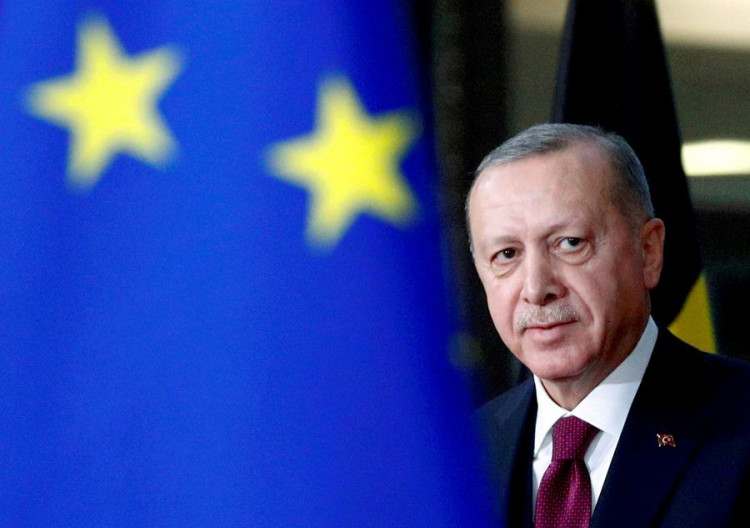In May of the previous year, Sweden and Finland jointly applied to join NATO. By April of the following year, Finland had officially become the 31st country to join the alliance, while Sweden's application was blocked by Turkey and Hungary.
Turkey's primary grievance with Sweden stems from the latter's support for the Kurdistan Workers' Party (PKK) and its Syrian branch, the People's Protection Units (YPG), as well as members of the Gülen movement, which Turkey accuses of orchestrating a failed coup. Both Turkey and the U.S., along with the EU, have designated the PKK as a terrorist organization.
In June of the previous year, a trilateral agreement was reached between Turkey, Sweden, and Finland regarding NATO membership. The two Nordic countries compromised, pledging to curb the activities of the PKK and its affiliates within their borders. However, earlier this year, far-right groups in Sweden held anti-Turkey protests outside the Turkish embassy in Sweden, where some demonstrators burned the Quran and waved PKK flags.
This incident infuriated Turkish President Recep Tayyip Erdogan, who criticized Swedish authorities for harboring terrorists and temporarily halted negotiations with Sweden. In the lead-up to the July NATO summit, various countries, including the U.S., pressured Turkey to greenlight Sweden's NATO membership.
While Turkey remained resistant, an agreement was eventually brokered with Sweden under the facilitation of NATO Secretary-General Jens Stoltenberg.
Terms of the Agreement Sweden agreed to provide a roadmap demonstrating its continued commitment to combating terrorism, fulfilling its trilateral agreement promises, ceasing support for the YPG, enhancing bilateral trade and investment with Turkey, and actively supporting Turkey's EU membership bid. Previously, Sweden had amended its constitution to bolster counter-terrorism efforts and resumed arms exports to Turkey.
In return, the Turkish government agreed to present Sweden's NATO application for a parliamentary vote and work closely with the parliament to ensure its approval.
The F-16 Bargaining Chip
The U.S.'s F-16 fighter jets were not explicitly mentioned in the agreement. However, since Finland and Sweden's NATO applications, the F-16s have been central to Turkey's negotiations with the U.S.
The Biden administration has shown interest in selling F-16s to Turkey, but there's bipartisan opposition in Congress. Members from both the House Foreign Affairs Committee and the Senate Foreign Relations Committee have stipulated that Turkey must first approve Sweden's NATO membership and address Greece's security concerns before the U.S. agrees to the F-16 sale. Turkey and Greece, both NATO members, have long-standing territorial and energy resource disputes.
On September 26, Erdogan explicitly told the U.S. that if the promise to sell F-16s is fulfilled, the Turkish parliament would vote on Sweden's NATO membership. The Turkish parliament is currently in summer recess and will reconvene in October.
Erdogan noted that while the U.S. has linked Sweden's NATO membership to the F-16 deal, Turkey also has a parliament to consider. He emphasized that if the U.S. fulfills its promise, the Turkish parliament would reciprocate, with the final decision on Sweden's NATO membership resting in its hands.
U.S. Congressional Stance
Chairman of the Senate Foreign Relations Committee, Democrat Bob Menendez, has been a vocal opponent of the F-16 sale to Turkey. He has called for Turkey to change its "hostile" attitude towards NATO allies and neighbors and improve its record on freedom of speech and human rights.
However, Menendez's opposition to the F-16 sale is no longer an obstacle. He and his wife were recently indicted for bribery after investigators found $500,000 in cash and gold bars at Menendez's residence. Following the charges, Menendez stepped down as chairman.
Erdogan acknowledged this development, stating that while Menendez's indictment gave Turkey an advantage, the F-16 issue wasn't solely dependent on him.
Chairman of the House Foreign Affairs Committee, Republican Mike McCaul, clarified that to provide Turkey with upgraded F-16s, the U.S. would need to supply Greece with more advanced fifth-generation F-35 fighter jets to maintain a balance of power against Turkey.
Turkey's F-16 Ambitions
Turkey's push to purchase upgraded F-16s is also tied to the F-35 program. As NATO's second-largest member, Turkey was part of the U.S. F-35 program, with plans to buy over 100 F-35s and having already paid the U.S. $1.4 billion in advance.
However, after Turkey purchased Russia's S-400 missile defense system, the U.S. expelled Turkey from the F-35 program and imposed sanctions. Turkey's F-35 purchase was intended to replace its aging fleet of older F-16s. Currently, Turkey has 270 older F-16s, making it the third-largest F-16 operator globally, after the U.S. and Israel.
After being barred from purchasing the F-35, Turkey began seeking 40 new F-16s and 80 F-16 upgrade kits in 2021, a deal worth up to $20 billion. The U.S. has not refunded the $1.4 billion Turkey previously paid for the F-35s, which will be used towards the new F-16 purchase.
Due to U.S. Congressional opposition, Turkey's plans to purchase the new F-16s have been delayed. Earlier this year, Erdogan complained that Turkey had already paid the U.S. $1.4 billion but received nothing in return. He warned that if the U.S. doesn't deliver, there would be consequences.
Hungary, on the other hand, rejected Sweden's NATO application due to Sweden's criticism of Hungary's rule of law. Hungary had expressed similar concerns about Finland's application but approved it after Turkey did.
Following Finland's NATO membership, NATO's border with Russia has doubled. Finland shares a 1,340-kilometer border with Russia, the longest among EU countries. If Sweden joins NATO, the Baltic Sea would be surrounded by NATO countries.
Baltic states Estonia, Latvia, and Lithuania are all NATO members, as are Poland, Germany, and Denmark on the southern and western shores of the Baltic Sea. Estonia and Latvia share borders with mainland Russia, while Poland and Lithuania border Russia's Kaliningrad exclave.
Sweden's strategic Gotland Island in the Baltic Sea is about 300 kilometers from Kaliningrad, the headquarters of Russia's Baltic Fleet.





